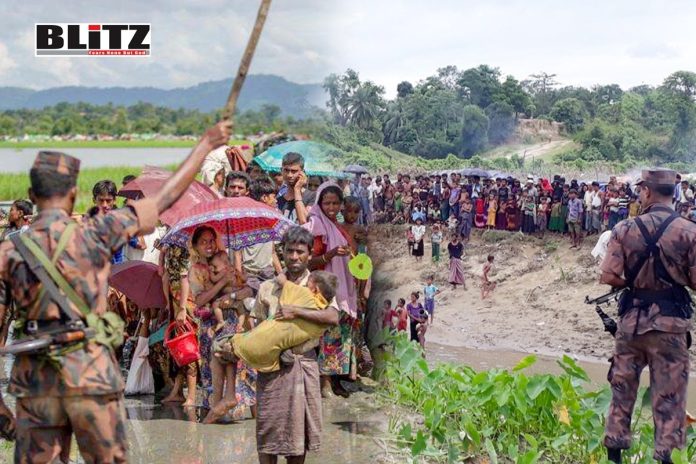Amidst the escalating clashes between the Myanmar army and the Arakan Army in the volatile region of Rakhine, Rohingyas find themselves compelled to flee their homes, seeking refuge in various corners of the state to evade the pervasive violence. Despite the earnest appeal from the United Nations for Bangladesh to extend humanitarian assistance by providing shelter to hundreds of Rohingya refugees stranded at the border areas, Bangladesh has resolutely turned down the proposition to accommodate any new arrivals from the embattled region.
This decisive stance was underscored during the most recent convening of the National Task Force on Rohingya Affairs at the hallowed halls of the Ministry of Foreign Affairs in Dhaka. The meeting, presided over by the esteemed Foreign Secretary Masud Bin Momen, counted among its attendees representatives from an array of governmental ministries, UN agencies, and other pertinent organizations.
The sound of gunfire echoing across border regions, from Naikshyongchari in Bandarban to Ukhia and Teknaf in Cox’s Bazar, has intensified since the beginning of the month. Disturbingly, reports continue to emerge of sporadic gunfire emanating from the border areas between Shahpari Island and St. Martin Union in Teknaf, with the disconcerting sounds lingering from last Friday night well into February 18.
Moreover, yesterday afternoon bore witness to a particularly distressing incident as a boat carrying Rohingyas was sighted entering Shahpari Island Jetty Ghat in Teknaf through the Naf River. Eyewitnesses recount a harrowing scene, with five individuals aboard the vessel, one of whom bore the scars of a gunshot wound. As twilight descended upon the scene, a palpable sense of apprehension hung in the air, compounded by the presence of a burgeoning crowd at the entrance of Shahpari Island Jetty Ghat, even as the vigilant Border Guard Bangladesh (BGB) personnel diligently restricted entry without divulging any official statement regarding the boat’s occupants.
The recent deliberations of the National Task Force veered away from the customary purview of reviewing the plight of Rohingya refugees and the meticulous implementation of policy directives. Instead, the discourse gravitated towards a contemplation of the profound repercussions of the raging civil war in Myanmar’s Rakhine State and its far-reaching implications for the sovereign territory of Bangladesh. During the course of the meeting, Sumbal Rizvi, representing the esteemed United Nations Refugee Agency (UNHCR), beseeched for humanitarian respite for the approximately 900 beleaguered Rohingyas ensnared at 19 precarious border points, only to be met with the sobering reality of Bangladesh’s prevailing limitations and the inexorable strain inflicted by the extant Rohingya populace.
Amidst the backdrop of relentless conflict and the unyielding territorial advances of the Arakan Army, officials harbored a palpable sense of skepticism regarding the prospect of effectively halting the inexorable tide of violence. Indeed, the uncertain fate of new Rohingya arrivals loomed large on the horizon, casting a pall of uncertainty over the feasibility of their eventual repatriation to their war-torn homeland.
In a related development, concerns were articulated regarding the prevailing level of United Nations engagement in the strife-ridden corridors of Rakhine, with particular emphasis placed on the efficacy of ongoing humanitarian aid endeavors amidst the tumult of conflict. Bangladesh, cognizant of the potential pitfalls attendant upon the presence of UN personnel in the theater of conflict or the erosion of cooperation, conveyed its apprehensions with characteristic candor. However, the UN’s response, while acknowledging the presence of select international non-governmental organizations laboring tirelessly in Rakhine, remained somewhat opaque, leaving room for further clarification and delineation of collaborative pathways.
Amidst the labyrinthine quagmire of conflict and displacement, the notion of establishing a humanitarian corridor in Rakhine emerged as a tentative salve to assuage the wounds inflicted by the crucible of war. Organizations of repute such as the venerable International Red Cross, renowned for their stalwart commitment to humanitarian causes, were mooted as potential stakeholders in this endeavor, particularly in the crucible of civil conflict.
The protracted conflict between the Arakan Army and the Myanmar army, which erupted on the fateful night of February 2nd, has exacted a toll in blood on both sides of the border, with incidents such as the mortar shell attack on February 5th at Ghumdhoom in Naikshyongchari, Bandarban, standing as grim testament to the relentless cycle of violence. Notably, the exodus of 330 individuals, including members of Myanmar’s border guard force, seeking refuge in the sanctuary of Bangladesh amidst the maelstrom of conflict, culminated in their repatriation to Myanmar on February 15th.
The influx of Rohingya refugees into the welcoming embrace of Bangladesh commenced in August 2017, with an estimated 800,000 souls displaced from the tormented landscapes of Rakhine state by the ruthless machinations of Myanmar’s military apparatus. At present, the specter of displacement casts its long shadow over the sprawling environs of 33 shelter camps in Ukhia and Teknaf, where a staggering 1.25 million registered Rohingyas eke out an existence marred by uncertainty and hardship. Alarmingly, the specter of repatriation remains but a distant mirage on the arid horizon, with six years of toil and tribulation yielding no discernible progress on this front.
Former Foreign Secretary Touhid Hossain, in a poignant reflection on Bangladesh’s Herculean efforts in extending succor to the beleaguered Rohingyas, underscored the imperative of preparing for a nuanced engagement with the myriad stakeholders destined to shape the contours of Rakhine’s future. In a landscape ravaged by the ceaseless tempests of conflict and displacement, the imperative of fostering informal channels of dialogue with the nascent arbiters of Rakhine’s destiny assumes paramount significance, offering a glimmer of hope amidst the gathering gloom of uncertainty and strife.




